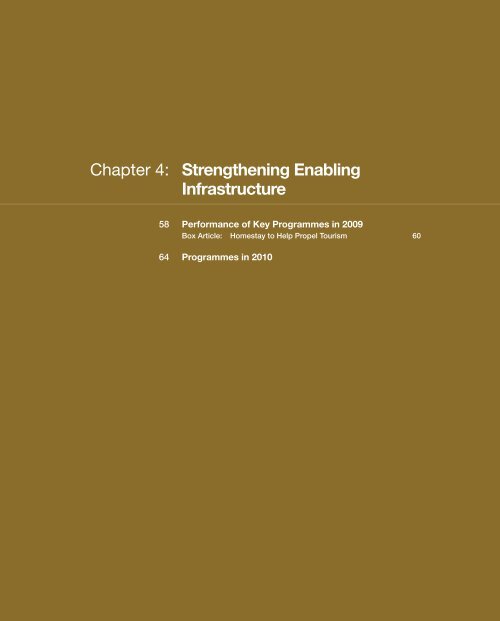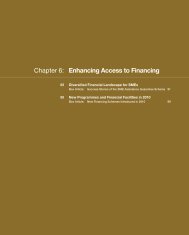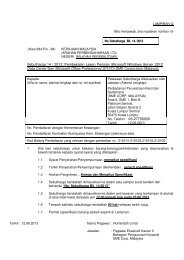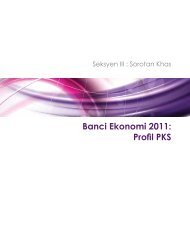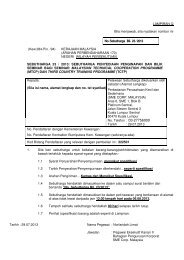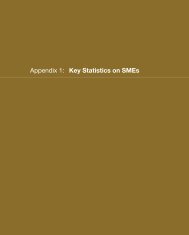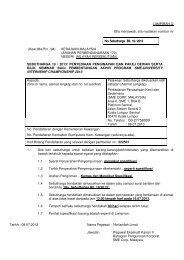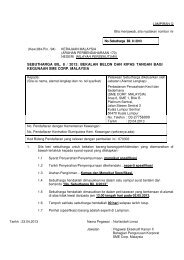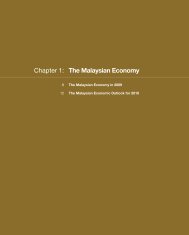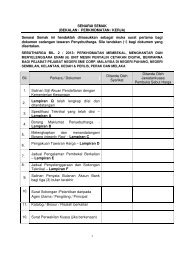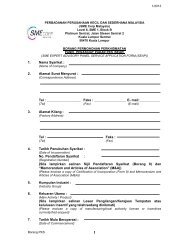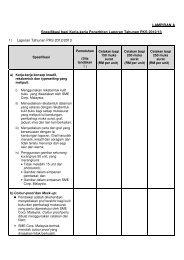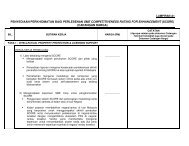Chapter 4 - SME Corporation Malaysia
Chapter 4 - SME Corporation Malaysia
Chapter 4 - SME Corporation Malaysia
You also want an ePaper? Increase the reach of your titles
YUMPU automatically turns print PDFs into web optimized ePapers that Google loves.
National <strong>SME</strong> Development Council<br />
<strong>SME</strong> ANNUAL REPORT 2009/10<br />
55<br />
CHAPTER 1<br />
The <strong>Malaysia</strong>n Economy<br />
<strong>Chapter</strong> 4: Strengthening Enabling<br />
Infrastructure<br />
58 Performance of Key Programmes in 2009<br />
Box Article: Homestay to Help Propel Tourism 60<br />
64 Programmes in 2010
CHAPTER 1<br />
56 National <strong>SME</strong> Development Council <strong>SME</strong> ANNUAL REPORT 2009/10<br />
The <strong>Malaysia</strong>n Economy
National <strong>SME</strong> Development Council<br />
<strong>SME</strong> ANNUAL REPORT 2009/10<br />
57<br />
CHAPTER 4<br />
Strengthening Enabling<br />
Infrastructure<br />
An enabling operating environment<br />
complemented by appropriate and<br />
adequate infrastructure is an important<br />
factor in supporting the growth of <strong>SME</strong>s.<br />
Thus, the Government continues to focus<br />
on addressing the gaps and enhancing<br />
further the physical and non-physical or<br />
soft infrastructure to create a conducive<br />
business environment for <strong>SME</strong>s to prosper<br />
and to compete in the global market.<br />
Strengthening Enabling Infrastructure
CHAPTER 4<br />
58 National <strong>SME</strong> Development Council <strong>SME</strong> ANNUAL REPORT 2009/10<br />
Strengthening Enabling Infrastructure<br />
Performance of Key Programmes in 2009<br />
Programmes under the enabling infrastructure are broadly divided into three<br />
areas, namely physical, information and regulatory infrastructure. In 2009, a<br />
total of 22 programmes with a financial commitment of RM70.5 million were<br />
implemented towards strengthening the enabling infrastructure for <strong>SME</strong>s.<br />
These programmes benefited a total of 278,200 <strong>SME</strong>s throughout the year<br />
Strengthening Enabling Infrastructure<br />
Physical Information Regulatory<br />
Slightly more than half of the programmes implemented in 2009 (55%, 12<br />
programmes) were devoted towards enhancing the physical infrastructure<br />
for <strong>SME</strong>s, while information and regulatory infrastructure accounted for the<br />
remaining seven programmes and three programmes respectively.
National <strong>SME</strong> Development Council<br />
<strong>SME</strong> ANNUAL REPORT 2009/10<br />
59<br />
CHAPTER 4<br />
Strengthening Enabling Infrastructure<br />
Physical Infrastructure<br />
In the pursuit of enhancing the<br />
physical environment for <strong>SME</strong>s to<br />
operate, the Government remains<br />
committed in setting up of business<br />
premises, factories, industrial parks<br />
and incubators. These initiatives<br />
would include development, upgrade<br />
or improvement of an area of land,<br />
building or other fixed structures for<br />
<strong>SME</strong>s to operate, or the setting-up of<br />
facilities such as distribution centres<br />
and central processing centres to<br />
support, facilitate and improve<br />
business operations and activities<br />
by <strong>SME</strong>s.<br />
In 2009, a total of 12 programmes<br />
were carried out to enhance the<br />
physical infrastructure for <strong>SME</strong>s with<br />
a total expenditure of RM68 million,<br />
benefiting more than 1,400 <strong>SME</strong>s.<br />
Most of these programmes (50%)<br />
were undertaken by the Ministry of<br />
Rural and Regional Development<br />
(MRRD). Among the programmes<br />
with significant outcomes include<br />
the followings:<br />
• The Business Premises/<br />
Workshop/Factories Infrastructure<br />
Programme with a total<br />
expenditure of RM18 million to<br />
provide better business premises<br />
for more than 200 rural<br />
Bumiputera entrepreneurs<br />
at affordable rates;<br />
• MRRD in collaboration with the<br />
Majlis Amanah Rakyat (MARA),<br />
implemented the Provision of<br />
Business Premises programme to<br />
provide business premises and<br />
factories to increase the number<br />
of Bumiputera entrepreneurs<br />
towards realising the objective<br />
of the Bumiputera Commercial<br />
and Industrial Community (BCIC).<br />
A total of RM39 million was<br />
spent under the programme<br />
to benefit 145 <strong>SME</strong>s in 2009;<br />
and<br />
• The programme to upgrade basic<br />
amenities and relevant<br />
infrastructure in kampung areas<br />
under the Homestay Programme<br />
by the Ministry of Tourism<br />
(MOTOUR) to enhance homestay<br />
activities and packages. A total of<br />
RM16.7 million was spent for this<br />
purpose, benefiting 141 homestay<br />
operators nationwide.
CHAPTER 4<br />
60 National <strong>SME</strong> Development Council <strong>SME</strong> ANNUAL REPORT 2009/10<br />
Strengthening Enabling Infrastructure<br />
Homestay brings together the<br />
main attractions of the <strong>Malaysia</strong>n<br />
lifestyle encompassing traditional<br />
dances and songs, local cuisine,<br />
traditional games such as kite<br />
flying, top-spinning, and congkak<br />
as well as cultural and ritual<br />
events such as wedding<br />
ceremony and festive celebration<br />
Homestays to Help Propel Tourism<br />
‘To know <strong>Malaysia</strong> is to love <strong>Malaysia</strong>’.<br />
Experiencing a homestay in a<br />
traditional village is perhaps one of<br />
the fastest and easiest ways to get to<br />
know and experience the “true”<br />
<strong>Malaysia</strong>. With this in mind, the<br />
Ministry of Tourism (MOTOUR)<br />
launched the Homestay Programme<br />
in 1995 as part of the initiatives under<br />
the Rural Tourism Masterplan. The<br />
programme is also popular among<br />
local tourists. Homestay aims to fulfill<br />
the requirements of two target<br />
groups. The first target group is the<br />
rural community, by developing<br />
entrepreneurship and increasing the<br />
source of income. The second target<br />
group is the tourists as the Homestay<br />
Programme provides a unique<br />
offering to experience life in a<br />
<strong>Malaysia</strong>n village, and thus bringing<br />
them closer to the local culture which<br />
in turns translates into greater<br />
appreciation of <strong>Malaysia</strong>’s rich<br />
heritage and diversity.<br />
Premised on the concept of lifestyle<br />
tourism, Homestay brings together<br />
the main attractions of the <strong>Malaysia</strong>n<br />
lifestyle encompassing traditional<br />
dances and songs, local cuisine,<br />
traditional games such as kite flying,<br />
top-spinning, and congkak as well as<br />
cultural and ritual events such as<br />
wedding ceremony and festive<br />
celebration. The lucky few will also<br />
have the opportunity to experience<br />
rural economic activities such as<br />
tapping rubber, planting/harvesting<br />
paddy, harvesting seasonal fruits,<br />
plucking coconuts and many more<br />
exciting activities!<br />
Over the years, the Homestay<br />
programme has successfully<br />
popularised rural tourism as another<br />
attraction in <strong>Malaysia</strong>. Since its<br />
inception, the number of homestay<br />
registered with MOTOUR has grown<br />
from merely 2 in 1996 to 141 in 2009<br />
with a total of 3,283 house operators
National <strong>SME</strong> Development Council<br />
<strong>SME</strong> ANNUAL REPORT 2009/10<br />
61<br />
CHAPTER 4<br />
and some 4,414 rooms. Meanwhile, the number of tourists staying at the<br />
homestays has grown more than a five-fold increase from a total of 31,883<br />
tourists in 2006 to 161,561 in 2009, of which 80% were domestic tourists.<br />
This translates to an increase of 71% in revenue generated from homestay<br />
programmes in 2009 to RM10.9 million (2008: RM6.4 million). Pahang topped<br />
the list by bringing in revenue of RM2.5 million, followed by Selangor (RM2.3<br />
million) and Negeri Sembilan (RM1.2 million). Among the states, the highest<br />
number of homestay operators is in East <strong>Malaysia</strong> with 19 operators in Sabah<br />
and 18 in Sarawak, followed by Selangor and Johor with 15 operators each.<br />
In promoting homestays, MOTOUR has implemented several strategies<br />
including enhancement through re-branding of the Programme. These<br />
strategies include:<br />
Strengthening Enabling Infrastructure<br />
Tightening registrations<br />
of Homestay<br />
Inspection of Homestay<br />
Selection of best<br />
Homestay by state<br />
Twinning Programmes<br />
Micro Enterprises<br />
Homestay<br />
Railway Tourism<br />
E-marketing promotions<br />
- To focus efforts on increasing the capability<br />
of existing Homestay operators<br />
- To ensure that homestay operators comply<br />
with the desired standards and quality, by<br />
conducting inspection once in three years<br />
- To acknowledge excellence. MOTOUR will<br />
identify the top three Homestays in each<br />
state for specific training and as the role<br />
model<br />
- To establish linkages with other countries<br />
that implement Homestay<br />
- To diversify the activities and income of<br />
Homestay operators<br />
- To promote homestays via <strong>Malaysia</strong>’s<br />
network i.e. the Singapore - Kelantan route<br />
to encourage inbound visitors from<br />
Singapore<br />
- To explore new avenues for promotion of<br />
Homestay via mobile alerts and blasts<br />
Throughout 2009, MOTOUR was<br />
also engaged in a series of initiatives<br />
designed to bring the programme to<br />
a higher level. This includes exploring<br />
into other activities that could be<br />
offered to the tourists as well as<br />
organising basic and specific training<br />
courses for Homestay operators such<br />
as <strong>Malaysia</strong> Welcomes the World<br />
(MWW) Programme, training in<br />
reflexology as well as organising<br />
seminars, visits and overseas<br />
courses on Homestay.<br />
The initiative of the participants in the<br />
Homestay Programme to undergo<br />
training has resulted in them not only<br />
being able to understand and cater to<br />
the needs and requirements of<br />
tourists, but empowered them with<br />
the right knowledge and people skills<br />
to manage their guests. One clear<br />
example of how the Homestay<br />
Programme has enhanced<br />
communities in the rural areas is in<br />
the success enjoyed by Kampung<br />
Kuala Medang in Hulu Jelai, Pahang<br />
which is today one of the more
CHAPTER 4<br />
62 National <strong>SME</strong> Development Council <strong>SME</strong> ANNUAL REPORT 2009/10<br />
Strengthening Enabling Infrastructure<br />
popular Homestays in the country.<br />
Taking advantage of its natural<br />
endowment blessed with rivers,<br />
waterfalls, a naturally preserved forest<br />
and caves, the villagers invested in<br />
marketing strategies that include the<br />
printing of brochures, flyers, short<br />
video clips and even to the extent of<br />
sponsoring stays for travel journalists<br />
and travel agents to boost the<br />
popularity of Kampung Kuala<br />
Medang. A great deal of time, effort<br />
and funds were also invested in<br />
upgrading the basic public amenities,<br />
improving the presentation of the<br />
village and enhancing the quality of<br />
services offered to visitors.<br />
From a village that had traditionally<br />
relied on farming, rubber tapping and<br />
growing of fruits, tourism has now<br />
become a big business and<br />
supported the community in<br />
Kampung Kuala Medang with a<br />
stable and promising source of<br />
additional income. In 2009, Kampung<br />
Kuala Medang attracted some 4,000<br />
tourists and in the process generated<br />
RM500,000 in revenue for the 71<br />
participants of the Homestay<br />
Programme. This is a commendable<br />
performance considering the fact that<br />
the village alone accounted for 20%<br />
of the total revenue of RM2.5 million<br />
derived from the Homestay<br />
Programme in the entire of Pahang.<br />
The number of visitors to Kampung<br />
Kuala Medang also accounted for<br />
26% of the total 15,000 tourists who<br />
visited some 29 Homestays in<br />
Pahang.
National <strong>SME</strong> Development Council<br />
<strong>SME</strong> ANNUAL REPORT 2009/10<br />
63<br />
CHAPTER 4<br />
Regulatory Infrastructure<br />
In order to ensure a comprehensive<br />
approach in strengthening enabling<br />
infrastructure for <strong>SME</strong>s, the<br />
Government has also put in place a<br />
supportive regulatory infrastructure<br />
that would spur the growth of <strong>SME</strong>s.<br />
These include the formulation and<br />
revision of guidelines, standards and<br />
requirements governing the<br />
operations and activities of <strong>SME</strong>s.<br />
Strengthening Enabling Infrastructure<br />
Information Infrastructure<br />
In an increasingly competitive business landscape, <strong>SME</strong>s need to equip<br />
themselves with updated information and to conduct market intelligence on a<br />
real time basis. Sharing of knowledge, experience and technical expertise<br />
would not only enhance the growth potential of <strong>SME</strong>s but also help businesses<br />
to remain relevant with the changing times. For this purpose, the Government<br />
continued to develop policies and programmes to upgrade, develop and<br />
improve management of information by Ministries and Agencies involved in<br />
<strong>SME</strong> development. This initiative will also include the development and<br />
enhancement of the on-line infrastructure available to <strong>SME</strong>s towards improving<br />
their business operations and efficiency.<br />
A total of seven programmes were carried out to enhance the information<br />
infrastructure in 2009 and these among others include:<br />
• The Knowledge Sharing programme implemented by the Ministry of<br />
Plantation, Industries and Commodities (MPIC) via the <strong>Malaysia</strong>n Palm Oil<br />
Board’s (MPOB) website which attracted close to 275,600 visitors during<br />
the year. The programme aims to make the website as an effective tool and<br />
platform to increase awareness on MPOB activities and to promote<br />
knowledge sharing amongst industry players;<br />
A total of three programmes were<br />
implemented in 2009 aimed at<br />
further strengthening the regulatory<br />
infrastructure with a total cost of<br />
RM2.7 million which had benefited<br />
241 <strong>SME</strong>s. These among others<br />
include the Development of <strong>Malaysia</strong>n<br />
Standards programme by MOSTI<br />
which aimed at promoting <strong>SME</strong>s’<br />
competitiveness through adoption of<br />
<strong>Malaysia</strong>n standards. Meanwhile,<br />
Ministry of Housing and Local<br />
Government (MHLG) also undertook<br />
the Nursery Accreditation programme<br />
and a Study on Industry Status and<br />
Planting Material Standards aimed<br />
at further enhancing the quality of<br />
the products and services in the<br />
landscape industry.<br />
• The Assessment of Vendors Programme and the Vendor e-registration<br />
programme by the Ministry of Energy, Green Technology and Water<br />
(MEGTW) in collaboration with Tenaga Nasional Berhad (TNB); and<br />
• The development of the <strong>SME</strong> Business Portal Programme by the Ministry of<br />
Science, Technology and Innovation (MOSTI) through MIMOS Berhad to<br />
support the development of <strong>SME</strong>s in K-Based industries.
CHAPTER 4<br />
64 National <strong>SME</strong> Development Council <strong>SME</strong> ANNUAL REPORT 2009/10<br />
Strengthening Enabling Infrastructure<br />
Programmes in 2010<br />
In 2010, the Government has<br />
allocated a total of RM193 million<br />
to further strengthen the enabling<br />
infrastructure for <strong>SME</strong>s through the<br />
implementation of 28 programmes.<br />
The programmes will continue to<br />
focus on three key areas under the<br />
strategic thrust, namely physical,<br />
regulatory and information<br />
infrastructure. The programmes are<br />
expected to benefit about 8,000<br />
<strong>SME</strong>s across all economic sectors.<br />
Physical Infrastructure<br />
More than 80% of the programmes<br />
in 2010 are aimed at strengthening<br />
the physical infrastructure for <strong>SME</strong>s.<br />
These involve programmes to<br />
develop, upgrade and/or improve<br />
<strong>SME</strong>s’ access to business premises,<br />
business centres, industrial lots and<br />
halal parks which are targeted to<br />
benefit 3,000 <strong>SME</strong>s.<br />
The majority of the programmes<br />
are by MRRD which among others<br />
include the Provision of Business<br />
Premises programme implemented<br />
through the Department of Orang<br />
Asli Affairs (JHEOA) with the target<br />
to establish eight new business<br />
premises and workshops that will<br />
benefit 1,200 participants. Meanwhile,<br />
as an effort to continuously increase<br />
the number of Bumiputera<br />
entrepreneurs, MRRD in collaboration<br />
with MARA will create a total of 526<br />
business premises under the<br />
Provision of Business Premises<br />
programme. MRRD will also build<br />
184 business premises under the<br />
Business Premises/Workshops/<br />
Factories Infrastructure Programme<br />
for rural Bumiputera entrepreneurs to<br />
operate at affordable rental rates.<br />
Meanwhile, the Factory Assistance<br />
Scheme (Skim Kilang <strong>SME</strong> Bank)<br />
implemented by the Ministry of<br />
International Trade and Industry (MITI)<br />
through the <strong>SME</strong> Bank is expected to<br />
provide a total of 422 factory spaces<br />
for rent to new Bumiputera<br />
entrepreneurs in strategic locations.<br />
The programme, with a financial<br />
commitment of RM60 million will<br />
benefit some 611 <strong>SME</strong>s, including<br />
the participants of the Entrepreneur<br />
Development Programmes under the<br />
<strong>SME</strong> Bank. MITI will also undertake<br />
the Collection and Marketing Centre<br />
for Entrepreneur Product (4PU)/<br />
Trading House programme, which<br />
involves the establishment of two<br />
centres to assist <strong>SME</strong>s in the<br />
manufacturing sector in terms of<br />
marketing, distributing and enhancing<br />
the quality of their products. The<br />
programme with an allocation of<br />
RM1.2 million is expected to benefit<br />
100 <strong>SME</strong>s.<br />
In addition, the Ministry of Finance<br />
(MOF) in collaboration with<br />
Perbadanan Kemajuan Iktisad Negeri<br />
Kelantan (PKINK) will establish 50<br />
manufacturing premises equipped<br />
with high capacity machinery and<br />
equipment for the production of halal<br />
food with a total cost of RM5 million<br />
under the Halal Product Development<br />
Project. Another project by MOF<br />
includes the Cottage Retail Shop<br />
programme in collaboration with the<br />
Urban Development Authority (UDA).<br />
The project aims to create 54 new<br />
business outlets in the cottage<br />
industry with a financial commitment<br />
of RM20 million.<br />
In an effort to spur the growth of<br />
<strong>SME</strong>s in Sabah, the Government<br />
through the Ministry of Industrial<br />
Development (MID) will also create<br />
73 new Bumiputera entrepreneurs<br />
under the Provision of Business<br />
Premises for Bumiputera<br />
Entrepreneurs programme. These<br />
entrepreneurs will be offered premises<br />
with rental rates that are 30% below<br />
the market price. The Ministry will<br />
also develop 69 industrial lots for<br />
<strong>SME</strong>s in the Sandakan Industrial<br />
Estate, Phase III – <strong>SME</strong> Zone.


